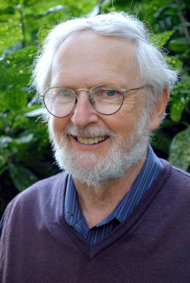Interview with 50-year GraduateJune 02, 2013
Dr. George Marsden (B.Div., '63) At this year’s commencement, Westminster celebrated those who graduated 50 and 60 years ago. One of those graduates who was not able to attend the ceremony was former Notre Dame professor, Dr. George Marsden. Recently, we spoke with Dr. Marsden about his time at Westminster and his work in academia. Dr. Marsden graduated from Westminster with a Bachelor of Divinity in 1963, where he studied under many of the original Westminster faculty. “I thought Westminster was a wonderful place when I was there. The teachers were a very impressive lot. Most of the old faculty was there, Van Til, Murray, Stonehouse. Paul Woolley was my history mentor. Also Meredith Kline was there, Ed Clowney was a very big influence, and John Sanderson was a terrific teacher. It had as strong a faculty as anywhere where I’ve studied, so I found Westminster a very helpful place to be and was an enjoyable community; there was a terrific community of students there.” While he went on to study and teach American history, he found that his time in theological training was very useful for understanding American Christian history. “Thinking back to the colonial era, it involves the Reformed tradition and for a lot of people that’s all very arcane and difficult. However, I found it relatively easier to understand. For instance, when I was writing on Jonathan Edwards I could bring together both cultural understandings and theological understandings that really put me in a good position to write on a topic like that.” After graduating from Westminster, Dr. Marsden received a Ph.D. at Yale University in American History. He went on from there to teach at Calvin College, where he taught American history in a Reformed context. After roughly 20 years at Calvin, he decided to move on and take a job at Duke Divinity School. “I went to Duke because I think Christians should be doing Christian education at the graduate level and the Ph.D. level, as well as at other levels, and that wasn’t going to happen at Calvin. Duke was a good place to do that, and I had a lot of wonderful graduate students.” He spent six years at Duke and then took a job at Notre Dame where he taught until his retirement in 2008. Through his time at these three institutions, his teaching focused on the relationship of the American church to its surrounding culture. “My emphasis is the inter-relationship between Christianity and the cultural setting (in this case the American cultural setting) and the degree to which Christianity shapes or is shaped by its cultural setting. Particularly, I’m interested in trying to identify what is essential in the Christian tradition and to distinguish that from the dimensions of Christian teaching which have arisen in particular times and places, which are more peripheral to the mainstream Augustinian tradition.” In this theme of Christianity and the American culture, Dr. Marsden published the book, Fundamentalism and American Culture (available at www.wtsbooks.com) in 1980, and a second edition in 2006. “I was trying to do an intellectual cultural history of fundamentalism. Fundamentalism has a substantial intellectual history that’s shaped largely by 19th century cultural experiences and philosophies. It developed a militancy in reaction to cultural changes and liberalism in the American churches, and became a mix of defending Christianity and defending a certain style of Americanism. In the second edition, I related that to the rise of political fundamentalism between 1980 and 2006. In 1980 the moral majority was just beginning. People had often spoken about fundamentalism as though it were largely apolitical, but then it became known mostly for its politics.” Since 2006, he witnessed a decline in fundamentalism. “The big change in 2006 is that I think fewer people use the term ‘fundamentalism’ as a self-descriptor than did at the beginning of the 20th century. I looked on the Liberty University website, and it’s pretty hard to find the word ‘fundamentalism’ there, and even at Bob Jones University you can find it but you have to do some digging. It’s not the first thing you see anymore about such institutions. My hypothesis is since 9/11, fundamentalism (as a word, not as a concept) has taken on a negative connotation for people today.” In the vein of American Christianity, Dr. Marsden devoted much of his time to the study of Jonathan Edwards, having published a biography of Edwards in 2003 (available at www.wtsbooks.com). During his time at Westminster, there was no emphasis on Edwards’ theology in Reformed circles. However, he has seen a renewal of interest more recently. “Today, I think a lot of people see Edwards as presenting a dynamic version of Reformed Theology. The sovereignty of God isn’t just an abstraction (it never was, but it sometimes comes off as that), but rather, God is constantly acting in everything. There is a sense that God’s love and beauty pervades the universe, and that, I think, provides a very helpful dynamic for Reformed Theology. I think Tim Keller in New York would be a good example of someone who’s been influenced by Edwards.” Since graduation, Dr. Marsden sees the biggest changes in the non-Western world. “I think the most encouraging trend since I was at Westminster is the amazing growth of Christianity around the world. Although Reformed Christianity isn’t nearly the largest group in that, it is part, and it provides tremendous opportunities for Reformed theology. In Africa or China, it’s incredible the degree of interest in all sorts of Christian theology. I teach part-time now at Calvin Seminary and also at Fuller Seminary and you see the terrific Asian influences there.” Dr. Marsden is currently working on a book for a series called “Lives of Great Religious Books.” His contribution will be on C. S. Lewis’ Mere Christianity. Please keep Dr. Marsden and his fellow 50-year graduates in your prayers as they seek to continue proclaiming the eternal Word to a changing world. |






